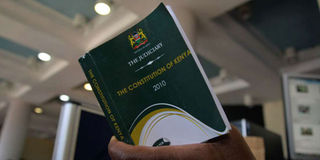When media should unpublish sensitive personal information

The Constitution protects the right to privacy. PHOTO | FILE | NATION MEDIA GROUP
What you need to know:
- There are times when the media should balance the privacy rights and reputation of an individual against the public right to know and the right of the media to freedom of expression.
- Whether the information is true or false does not really matter; what does is whether the information is an unjustified intrusion into an individual's private life without consent.
Every one of you who participated in judging the Miss Soba case voted to have the Nation unpublish her photo (“Readers Have Their Say”, Daily Nation, September 6, 2019).
A Nation photographer took her picture five years ago while she was undergoing an Alcoblow test for drink-driving.
She was 18 and very photogenic. Nation editors seem to have loved the picture and have since continued to use it, despite her loud protests, to illustrate stories related to drink-driving — even though she had passed the test.
I concur with your judgment that the Nation should take down the picture, and I have recommended that to the editors.
There are times, as in the case of Miss Soba, when the media should balance the privacy rights and reputation of an individual against the public right to know and the right of the media to freedom of expression.
In this case, the privacy rights and reputation of Miss Soba outweigh the public right to know and media freedom of the media.
INTRUSIVE
Besides, a picture of Miss Soba blowing into an Alcoblow is not a matter of public interest (not to be confused with what the public are interested in).
In such circumstances, whether the information is true or false does not really matter; what does is whether the information is an unjustified intrusion into an individual's private life without consent and a possible denigration of their reputation.
The Media Council of Kenya’s “Guiding principles” include the requirement that journalists must respect the personal dignity and privacy of others and demonstrate respect for their rights.
The Constitution protects the right to privacy, which includes the right not to have information relating to one's private affairs unnecessarily revealed.
And every person has the right to the correction or deletion of untrue or misleading information that affects him or her.
EDITORIAL POLICY
The NMG Editorial Policy provides no guidelines for the deletion of stories once published.
Yet requests for deletion of stories, including pictures, have been increasing over the years and editors do not have universally accepted criteria for dealing with such requests.
In the absence of such a criteria, NMG editors should be guided by the best practices among news organisations in other countries. A number of criteria and rules have emerged on unpublishing stories.
Stories can be unpublished if, among other circumstances, there are compelling legal reasons, such as if the story is defamatory or violates privacy rights, or is obsolete, unfair, irrelevant, out of date, and inaccurate.
Send your complaints to [email protected]. Call or text 0721 989 264





